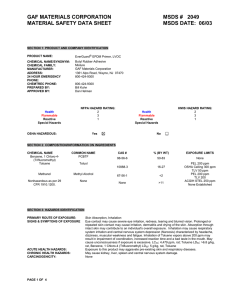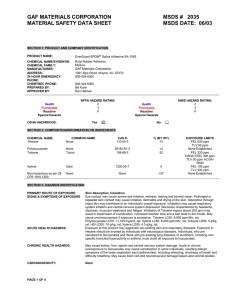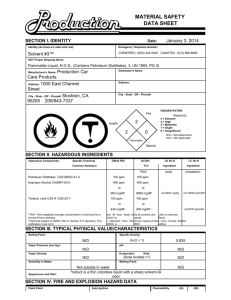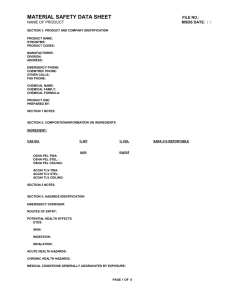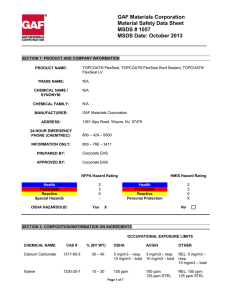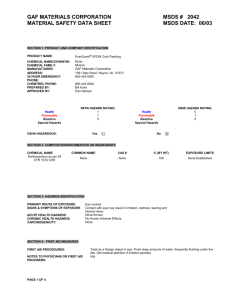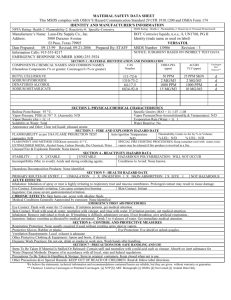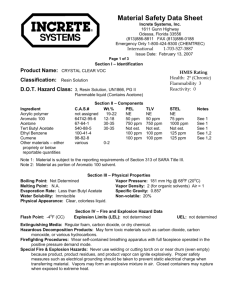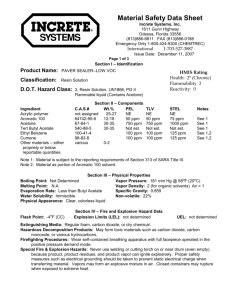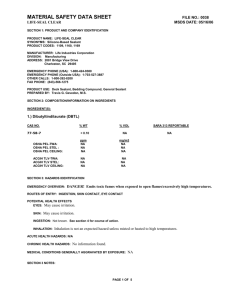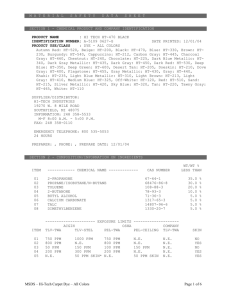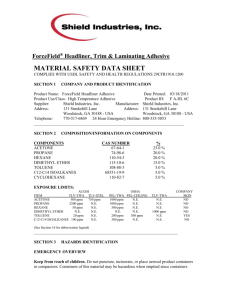EverGuard® EPDM Primer- MSDS #2050
advertisement
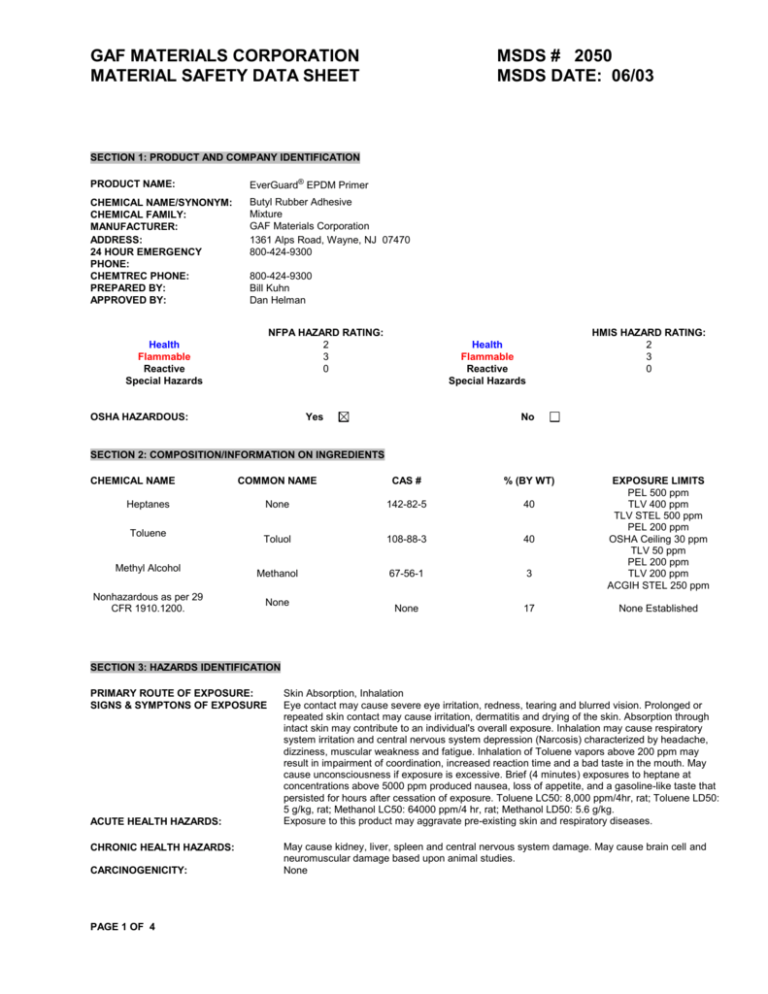
GAF MATERIALS CORPORATION MATERIAL SAFETY DATA SHEET MSDS # 2050 MSDS DATE: 06/03 SECTION 1: PRODUCT AND COMPANY IDENTIFICATION PRODUCT NAME: EverGuard® EPDM Primer CHEMICAL NAME/SYNONYM: CHEMICAL FAMILY: MANUFACTURER: ADDRESS: 24 HOUR EMERGENCY PHONE: CHEMTREC PHONE: PREPARED BY: APPROVED BY: Butyl Rubber Adhesive Mixture GAF Materials Corporation 1361 Alps Road, Wayne, NJ 07470 800-424-9300 800-424-9300 Bill Kuhn Dan Helman NFPA HAZARD RATING: 2 3 0 Health Flammable Reactive Special Hazards OSHA HAZARDOUS: HMIS HAZARD RATING: 2 3 0 Health Flammable Reactive Special Hazards Yes No SECTION 2: COMPOSITION/INFORMATION ON INGREDIENTS CHEMICAL NAME Heptanes Toluene Methyl Alcohol Nonhazardous as per 29 CFR 1910.1200. COMMON NAME CAS # % (BY WT) None 142-82-5 40 Toluol 108-88-3 40 Methanol 67-56-1 3 None 17 None EXPOSURE LIMITS PEL 500 ppm TLV 400 ppm TLV STEL 500 ppm PEL 200 ppm OSHA Ceiling 30 ppm TLV 50 ppm PEL 200 ppm TLV 200 ppm ACGIH STEL 250 ppm None Established SECTION 3: HAZARDS IDENTIFICATION PRIMARY ROUTE OF EXPOSURE: SIGNS & SYMPTONS OF EXPOSURE ACUTE HEALTH HAZARDS: CHRONIC HEALTH HAZARDS: CARCINOGENICITY: PAGE 1 OF 4 Skin Absorption, Inhalation Eye contact may cause severe eye irritation, redness, tearing and blurred vision. Prolonged or repeated skin contact may cause irritation, dermatitis and drying of the skin. Absorption through intact skin may contribute to an individual's overall exposure. Inhalation may cause respiratory system irritation and central nervous system depression (Narcosis) characterized by headache, dizziness, muscular weakness and fatigue. Inhalation of Toluene vapors above 200 ppm may result in impairment of coordination, increased reaction time and a bad taste in the mouth. May cause unconsciousness if exposure is excessive. Brief (4 minutes) exposures to heptane at concentrations above 5000 ppm produced nausea, loss of appetite, and a gasoline-like taste that persisted for hours after cessation of exposure. Toluene LC50: 8,000 ppm/4hr, rat; Toluene LD50: 5 g/kg, rat; Methanol LC50: 64000 ppm/4 hr, rat; Methanol LD50: 5.6 g/kg. Exposure to this product may aggravate pre-existing skin and respiratory diseases. May cause kidney, liver, spleen and central nervous system damage. May cause brain cell and neuromuscular damage based upon animal studies. None GAF MATERIALS CORPORATION MATERIAL SAFETY DATA SHEET MSDS # 2050 MSDS DATE: 06/03 SECTION 4: FIRST AID MEASURES FIRST AID PROCEDURES: NOTES TO PHYSICIANS OR FIRST AID PROVIDERS: If this material contacts the eyes, hold eyelids open and flush immediately with a gentle stream of water for at least 15 minutes, preferably at an eyewash fountain. Get medical attention. In case of skin contact, clean with rubbing alcohol first, followed immediately by washing affected area with soap and water. In case of inhalation, remove to fresh uncontaminated air. Administer oxygen if breathing is labored. Give artificial respiration if breathing has stopped. Get medical attention immediately if oxygen or artificial respiration are administered. In case of accidental ingestion, do not induce vomiting. Get medical attention and advise the physician of the nature of the material. N/a SECTION 5: FIRE-FIGHTING PROCEDURES Foam, water spray, (fog), Carbon Dioxide, dry chemical, and vaporizing liquid type extinguishing agents may all be suitable for extinguishing fires involving this product. Water may be ineffective, but should be used to keep fire exposed containers cool. If a leak or spill has ignited, use water to disperse the vapors and to protect persons attempting to stop a leak. Water spray may be used to flush spills away from exposures. Carbon Dioxide, Carbon Monoxide, Aldehydes, acrid smoke and irritating fumes. Wear impermeable protective clothing and self-contained breathing apparatus. Toxic fumes or vapors may be produced. This product is volatile and gives off invisible vapors. Either the liquid or vapor may settle in low areas or travel some distance along the ground or surface to ignition sources where they may ignite or explode. SUITABLE EXTINGUISHING MEDIA: HAZARDOUS COMBUSTION PRODUCTS: RECOMMENDED FIRE FIGHTING PROCEDURES: UNUSUAL FIRE & EXPLOSION HAZARDS: SECTION 6: ACCIDENTAL RELEASE MEASURES ACCIDENTAL RELEASE MEASURES: N/a SECTION 7: HANDLING AND STORAGE HANDLING AND STORAGE: OTHER PRECAUTIONS: STEPS TO BE TAKEN IN CASE MATERIAL IS REALEASED OR SPILLED: N/a N/a Shut off and eliminate all ignition sources. Keep people away. Recover free product. Add sand, earth or other suitable absorbent to spill area. Minimize breathing vapors. Minimize skin contact. Ventilate confined spaces. Open all windows and doors. Keep product clear of sewers, water, or extensive land areas. Assure conformity with applicable government regulations. Continue to observe precautions for volatile, flammable vapors from absorbed material. PRECAUTIONS TO BE TAKEN IN HANDLING & STORAGE: Keep away from heat, sparks, and open flames. Keep containers closed. Vapors of this material are heavier than air and will collect in low or confined areas. Containers, even those that have been emptied, can contain explosive vapors. Do not cut, drill, grind, weld or perform similar operations near containers. Static electricity may accumulate and create a fire hazard. Ground fixed equipment. Bond and ground all transfer containers and equipment. SECTION 8: EXPOSURE CONTROLS/PERSONAL PROTECTION ENGINEERING CONTROLS: VENTILATION: RESPIRATORY PROTECTION: PAGE 2 OF 4 N/a Use with ventilation sufficient to prevent exceeding recommended exposure limits or build up of explosive concentrations of vapor in air. If personal exposure concentrations cannot be maintained below the appropriate GAF MATERIALS CORPORATION MATERIAL SAFETY DATA SHEET MSDS # 2050 MSDS DATE: 06/03 exposure limits using engineering controls, a NIOSH approved organic vapor air purifying respirator may be appropriate based on employer-determined exposure levels. Air supplied or SCBA respirators may be required when the measured chemical concentration exceeds the capacity of the air purifying respirator or when personal exposure levels are unknown. Safety glasses with side shields are recommended when pouring or applying this product. Wear polyvinyl alcohol, nitrile rubber, or neoprene glove when handling this product to avoid prolonged skin contact. Not required. EYE PROTECTION: SKIN PROTECTION: OTHER PROTECTIVE CLOTHING OR EQUIPMENT: WORK HYGIENIC PRACTICES: Wash exposed skin prior to eating, drinking or smoking and at the end of each shift. Wash contaminated clothing prior to reuse. EXPOSURE GUIDELINES: SECTION 9: PHYSICAL AND CHEMICAL PROPERTIES APPEARANCE & ODOR: FLASH POINT: METHOD USED: EVAPORATION RATE: pH (undiluted product): Slightly viscous liquid / Aromatic odor 0°F LOWER EXPLOSIVE LIMIT: Tagliabue closed tester UPPER EXPLOSIVE LIMIT: Unknown BOILING POINT: Not Applicable MELTING POINT: SOLUBILITY IN WATER: Insoluble PERCENT VOLATILE: 1.2% 7.0% 151-284° F Not Applicable 0.793 (Water=1) 83% WITHOUT WATER (LBS/GAL): N/a SPECIFIC GRAVITY: 3.0-3.7 (Air=1) VAPOR DENSITY: 95-125 mm Hg @ 20°C VAPOR PRESSURE: VOLATILE ORGANIC COMPOUNDS (VOC) N/a WITH WATER (LBS/GAL): N/a MOLECULAR WEIGHT: SECTION 10: STABILITY AND REACTIVITY THERMAL STABILITY: CONDITIONS TO AVOID (STABILITY): STABLE UNSTABLE Avoid flames, sparks or other sources of ignition. Incompatible with acids, alkalies and strong oxidizing agents. N/a INCOMPATIBILITY (MATERIAL TO AVOID): HAZARDOUS DECOMPOSITION OR BYPRODUCTS: HAZARDOUS POLYMERIZATION: N/a Will not occur _______________________________________________________________________________________________________________ SECTION 11: TOXICOLOGICAL INFORMATION TOXICOLOGICAL INFORMATION: N/a SECTION 12: ECOLOGICAL INFORMATION N/a ECOLOGICAL INFORMATION: _____________________________________________________________________________________________________________ SECTION 13: DISPOSAL CONSIDERATIONS WASTE DISPOSAL METHOD: RCRA HAZARD CLASS: PAGE 3 OF 4 N/a N/a GAF MATERIALS CORPORATION MATERIAL SAFETY DATA SHEET MSDS # 2050 MSDS DATE: 06/03 SECTION 14: TRANSPORT INFORMATION U.S. D0T Highway Transportation PROPER SHIPPING NAME: HAZARD CLASS: ID NUMBER: PACKING GROUP: LABEL STATEMENT: OTHER REQUIREMENTS: U.S. DOT Water Transporation PROPER SHIPPING NAME: HAZARD CLASS: ID NUMBER: PACKING GROUP: LABEL STATEMENT: U.S. DOT Air Transporation PROPER SHIPPING NAME: HAZARD CLASS: ID NUMBER: PACKING GROUP: LABEL STATEMENT: Adhesives, 3, UN1133, II 3 UN 1133 Flammable Liquid Unknown OTHER REGULATORY AGENCIES PROPER SHIPPING NAME: HAZARD CLASSIFACTION: ID NUMBER: LABELS REQUIRED: OTHER REQUIREMENTS: SECTION 15: REGULATORY INFORMATION U.S. FEDERAL REGULATIONS: TSCA (TOXIC SUBSTANCE CONTROL ACT): CERCLA (COMPREHENSIVE RESPONSE COMPENSATION, AND LIABILITY ACT): SARA TITLE III (SUPERFUND AMENDMENTS AND REAUTHORIZATION ACT): 311/312 HAZARD CATEGORIES: 313 REPORTABLE INGREDIENTS: N/a N/a N/a N/a N/a _________________________________________________________________________________________________________________ SECTION 16: OTHER INFORMATION ADDITIONAL COMMENTS: DATE OF PREVIOUS MSDS: CHANGES SINCE PREVIOUS MSDS: TELEPHONE NUMBER FOR ADDITIONAL INFORMATION: PAGE 4 OF 4 None 10/02 Phone Numbers 800-766-3411
